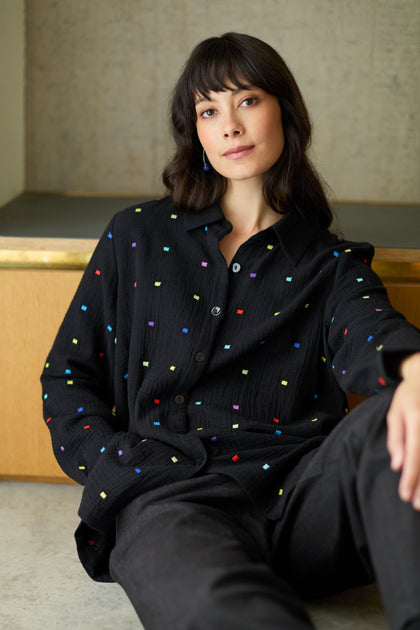Gardening is more than a hobby; it's a passion, an escape, an echo of nostalgia that resonates with many in the Sahara community. In the rhythm of planting and nurturing, we find an activity that transcends generations—a shared love for the beauty and bounty found in nature.
In the world of horticulture, Joe Clark emerges as a guide, beckoning us to explore the transformative power of gardens. Author of the upcoming book "Garden to Save the World," Joe shares his wealth of knowledge and invites readers into a realm where gardening reaps holistic benefits. We were lucky enough to delve into the philosophy and inspirations that fuel Joe's passion for green living. From childhood memories to unconventional gardening approaches, Joe imparts wisdom that extends beyond the pages of his book. Joe's insights not only guide us through the intricacies of cultivating life but also speak to the collective heartbeat of a community that finds solace and joy in blossoming gardens.

Your book emphasizes the positive impact of gardens on both the environment and human well-being. What personal experiences or moments inspired you to write "Garden to Save the World"?
I can’t recall any eureka moments, instead I would say it was a collection of memories/experiences over the years. A while back I was thinking about childhood memories, and the garden was a recurring theme throughout most of them. I believe many of us have great childhood memories being outside on nice sunny days, and if it brought so much joy and happiness then, surely it can do the same now. What inspired me to write not just a gardening book, but one that links together all aspects of nature was actually Sir David Attenborough. The incredible popularity of his recent work, especially amongst my generation, really highlighted just how much people care and are fascinated by the natural world, and I wanted to showcase how this amazing world is accessible closer to home with any size garden.
In the book, you mention that you believe in bending the rules when it comes to gardening. Can you elaborate on how a more relaxed approach to rule following can contribute to the success of a garden?
Sometimes I think it’s human nature to want to break, or at least bend the rules a little bit. That’s how we add our own personality to life and prevents things being a tad boring. The same can be said with gardening. While there is nothing wrong with following the traditional rule book (if there even is such a thing anymore), I always like to try new things, grow different plants, and just have fun. Experimenting keeps gardening fresh and fun, which is likely to keep you more invested in the long run. It’s important to remember, it does not matter if your little experiment doesn’t work, some of mine fail but lots more tend to work.
What advantages come with cultivating your own food? For individuals who may be new to gardening or hesitant to start, what advice would you offer to inspire them to explore and embrace the joys of gardening?
Oh wow, where do I start with this? Personally, I grow food for the most part to connect with nature and detatch myself from reality for a few minutes each day, to harness the health benefits that brings. The other benefits such as eating fresh, reducing food miles, saving money and just an all-round sense of achievement are an added bonus.
Do you have specific recommendations for novice gardeners looking to start with food crops, perhaps suggesting some ideal "starter crops"?
This is possibly the most common question I get asked, and I always give the same answer. It is always wise to start small and grow what you like to eat. You really do not need much to get started. A container, good quality compost and a reliable packet of seeds is all you need really. When it comes to choosing your crops, grow what you actually like to eat. You might hear radishes for example are fast and easy to grow (which is true), but if you hate the taste, then that space is better used for something else. However, there are a few must tries for me: Garden peas, fresh lettuce, cherry tomatoes and if you have the space sweetcorn. There is just no comparing shop bought and home grown for these crops.
Your great-grandmother played a significant role in introducing you to gardening and nature. How did her teachings influence your understanding of the natural world? Have you incorporated those lessons into your own gardening practices?
Yes, that is correct, my great grandmother played a big role in introducing me to gardening. She showed me just how interconnected the natural world is. She opened my eyes to the method of gardening, which is now wildly known as organic gardening, where the key to success is to establish an ecosystem, full of life in your garden, and then allow it to achieve a natural balance. I soon realised that most ‘issues’ your garden might face, will have a natural solution. Too many aphids, then attract ladybirds. Slugs eating all your crops, then consider making a small pond for frogs and toads. This is why my style of gardening is perhaps more nature focused, and not solely about the crops I am growing. It never ceases to amaze me the amount of nature you can attract in the most unlikely of places, all while growing your own food too!
You express the idea that gardens can shape the world we live in, and we couldn’t agree more. Can you share instances of gardens making a positive impact, either on an environmental or community level?
Over the last few years I think we definitely saw how gardens are one of the best tools we have to connect people on a social level. Whether that was through covid when restrictions were still in place for inside buildings, gardens provided us a safer space to meet friends and family. But also on an environmental level. A rebound in some species is actually being attributed to the rise of casual gardeners. One such group of species are our small birds in the UK. There has been a boom in the levels of people providing bird feed, as well as letting flowers die back and produce seed naturally. This boost in manmade food, combined with the natural food that organic gardening creates, has been the driving force for improving some bird populations according to some sources. If we can achieve that for one species, I see no reason why we can’t for others.
You encourage readers to treat the book as a guide rather than a set of definitive rules. How important do you think it is for people to find their own way of gardening, and what flexibility have you found beneficial in your own gardening journey?
I encourage people to treat all gardening literature as a guide rather than a rule book, as there are no right and wrong ways to garden. Instead, there are a list of best practices that myself and other gardeners recommend, but these are by nature there to be amended and added to in order to fit your circumstances. In my garden I often tamper with the recommended seed sowing calendar. Sometimes people are put off sowing certain seeds as they have read it has to be sown by April and it’s now May for example, but I always encourage you to try. Last year I planted most of my crops a month or two later than recommended, and to my surprise it was my most abundant year to date, albeit a slightly later harvest.
With a background in law, it was a courageous transition into sharing your gardening journey online. How has your career trajectory and varied interests informed your approach to gardening and how you share with your followers?
I’ve always had a side of me that likes to follow the path that nobody is going down, rather than the one that is probably safer to stick with. Sometimes this pays off and sometimes it doesn’t. I guess this can be seen in my approach to gardening, as I have been growing crops not normally found in British gardens and allotments for years. I often do things slightly differently than others just to see what happens. I mean after all you can always go back to the traditional tried and tested path if needed.
With a loyal online following, how do you see the role of social media in spreading gardening knowledge and inspiring people to connect with nature? What challenges and opportunities have you encountered in reaching such a large audience?
Social media is the single most powerful tool we have and when used for good it really is incredible. I have viewers from every continent (excluding Antarctica) which without social media simply wouldn’t be possible. Sharing the joys of gardening, nature and living green to people all across the globe is truly an honour, and I am aware of just how lucky I am to be able to do so. However, the more the channels grow, the harder it is to connect on an individual level. Before I could easily reply to every message, but now, unfortunately, that’s impossible.
You challenge the misconception that gardening is reserved for a specific age group or certain types of spaces. How can individuals, regardless of age or space constraints, actively participate in gardening, and what benefits might they enjoy?
I actually believe there are more young gardeners than people imagine, the problem is at a young age it is often not seen by your peers as the coolest hobby in the world, so it is kept behind closed doors. I kept my hobby a secret as a child too, until I appeared in the newspaper for growing a record pumpkin, and all of a sudden, my peers thought it was cool, and I realised how there was no need to hide it. As social media gets more and more popular, opinions on gardening are definitely changing which is inviting in a younger crowd. Even if you don’t have a garden you can still get involved by joining an allotment or shared garden. If these are not available there are always volunteering opportunities for local clubs, charities and councils who always need gardening help. By getting involved at this level you will realise what a friendly and inviting bunch gardeners are.
As gardening gains popularity, what trends do you foresee in the world of gardening, and how do you envision the future role of gardens in contributing to a sustainable and positive global environment?
The biggest trend I predict over the next few years is the rise of small space urban gardens. Large gardens are unfortunately becoming more and more of a luxury, so gardeners will be forced to think smaller. Instead of flower borders and vegetable patches, I predict a rise in container growing. Small space container growing is not only far easier to manage, but with a little planning can actually be quite fruitful, especially with the vast choice of dwarf seed varieties now available. There has been a massive push for more eco-friendly gardening too, from reducing and recycling plastic to the banning of peat. If this continues then not only will our plants help provide homes and food for nature, but our consumption to grow these plants, will not be as damaging on the planet.
For individuals who may be new to gardening or hesitant to start, what advice would you offer to inspire them to explore and embrace the joys of gardening?
Start small and start cheap. Don’t look at the gardens you see online and in your first year try to replicate them. While you will definitely have the ability to do so, going from nothing to a complex garden takes considerable resources and time. Instead add little by little and that way you will never get overwhelmed. It has taken me nearly 22 years to build my garden, so please don’t rush to replicate the same. Most importantly just have fun! Remember we all have garden fails, and that’s just part of the fun, for everything that might not go quite right, you will have hundreds more that do.
To pre-order your copy of "Garden to Save the World" see link here. You can also learn more about Joe's Garden and access his free Grow Guides at Joe's Garden.







